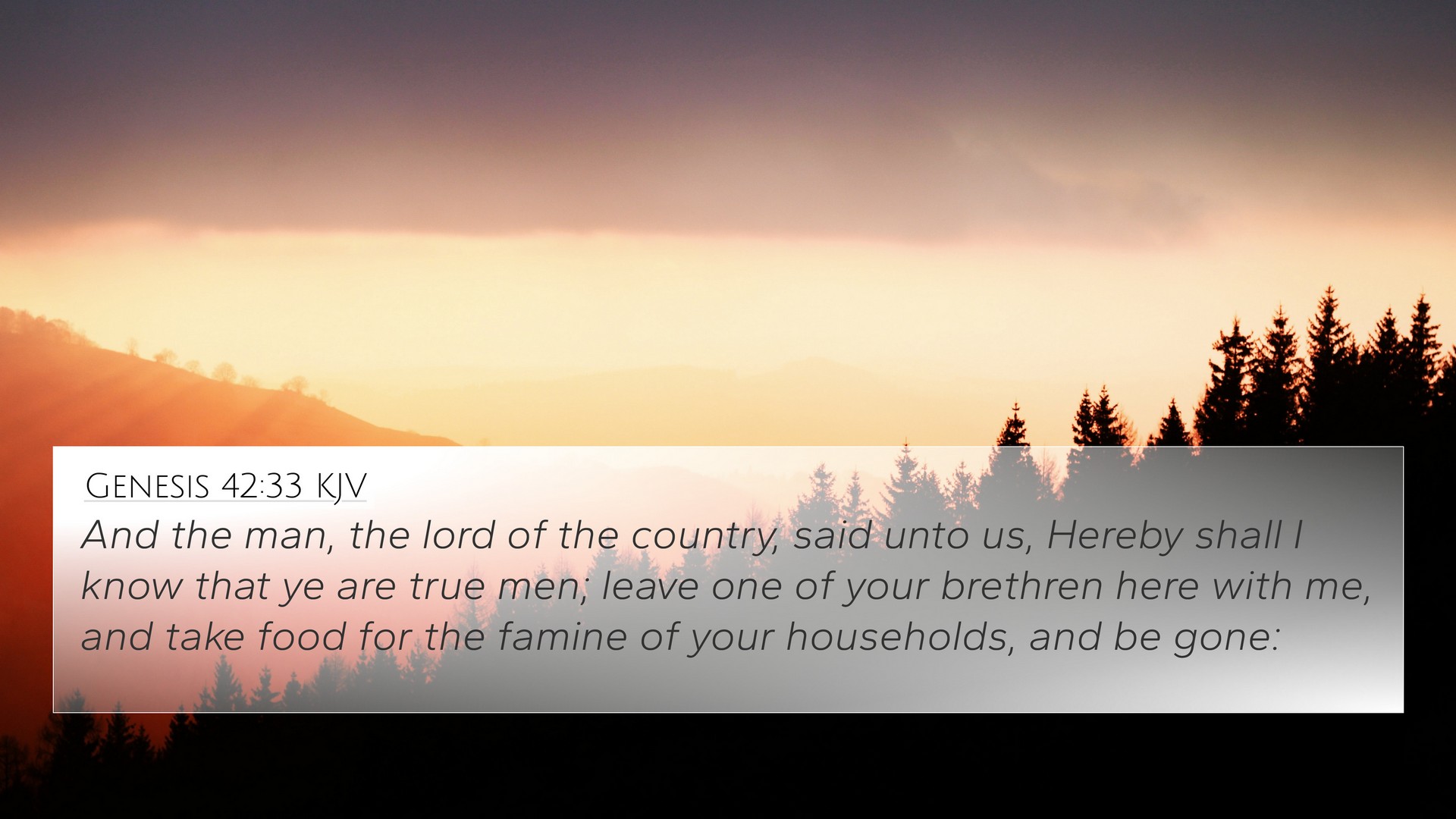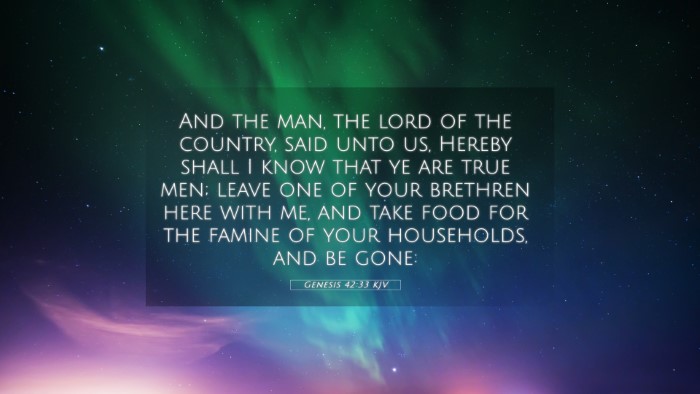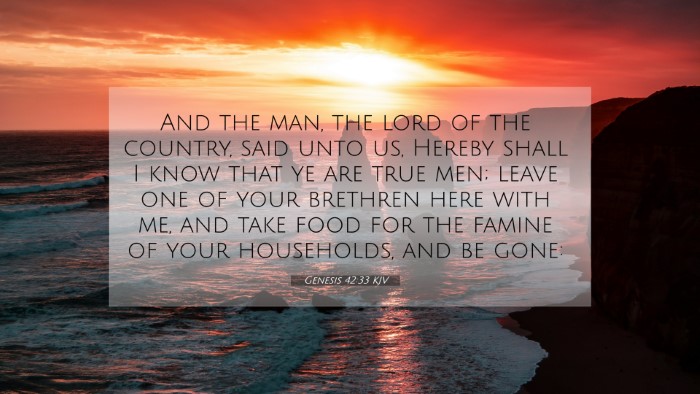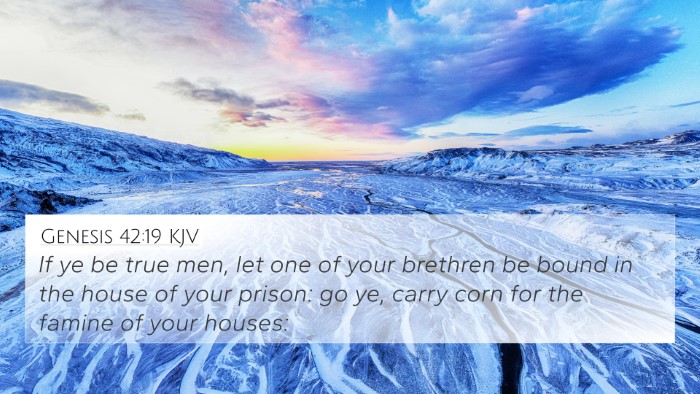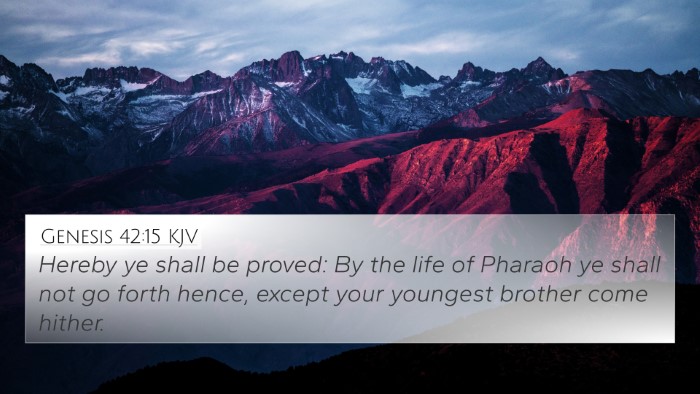Understanding Genesis 42:33
Genesis 42:33 states: "And the man, the lord of the country, said unto us, Hereby shall I know that ye are true men; leave one of your brethren here with me, and take food for the famine of your households, and be gone." This verse occurs within the context of Joseph's dealings with his brothers during their visit to Egypt to buy grain during a famine. The scripture reveals deep themes of trust, betrayal, and redemption, important elements within the narrative of Genesis.
Summary and Interpretation
The verse depicts the moment when Joseph, who is known to be the Lord of Egypt, challenges his brothers to prove their integrity. He suggests leaving one brother in Egypt while the others return home with supplies. This situation serves multiple purposes within the narrative:
- Testing the Brothers: Joseph seeks to ascertain whether his brothers have genuinely changed since they sold him into slavery. This test reveals their character and intentions.
- Foreshadowing Redemption: The tension of leaving one brother behind sets the stage for eventual reconciliation and redemption of the family unit.
- Thematic Unity: This moment highlights the themes of familial loyalty and responsibility that permeate the entire Genesis narrative.
Bible Cross-References
To further comprehend the depth of Genesis 42:33, cross-referencing with related scriptures can be invaluable. Here are several pertinent verses that resonate with this passage:
- Genesis 37:28: "Then there passed by Midianites, merchantmen; and they drew and lifted up Joseph out of the pit, and sold Joseph to the Ishmaelites for twenty pieces of silver: and they brought Joseph into Egypt." (This verse reveals the betrayal that set this narrative in motion.)
- Genesis 45:4-5: "And Joseph said unto his brethren, Come near to me, I pray you. And they came near. And he said, I am Joseph your brother, whom ye sold into Egypt. Now therefore be not grieved, nor angry with yourselves, that ye sold me hither: for God did send me before you to preserve life." (Joseph’s ultimate reveal and reconciliation.)
- Genesis 50:20: "But as for you, ye thought evil against me; but God meant it unto good, to bring to pass, as it is this day, to save much people alive." (Understanding God’s sovereign plan through adversity.)
- Exodus 20:5: "Thou shalt not bow down thyself to them, nor serve them: for I the Lord thy God am a jealous God, visiting the iniquity of the fathers upon the children unto the third and fourth generation of them that hate me;" (Exploring themes of familial consequences in relationships.)
- Romans 8:28: "And we know that all things work together for good to them that love God, to them who are the called according to his purpose." (A New Testament application of the themes of divine purpose amidst trials.)
- Matthew 7:12: "Therefore all things whatsoever ye would that men should do to you, do ye even so to them: for this is the law and the prophets." (The moral implications of how we treat one another.)
- 1 John 1:9: "If we confess our sins, he is faithful and just to forgive us our sins, and to cleanse us from all unrighteousness." (Themes of forgiveness and restoration echo throughout the narratives of scripture.)
Connections Between Bible Verses
The connections between these verses highlight a broader narrative that goes beyond just the story of Joseph. They explain the themes of restoration, the impact of sin, and God's overarching plan for humanity.
Thematic Bible Verse Connections
In Genesis 42:33, Joseph’s actions prompt a reflection on the following themes:
- Transformative Experiences: Just as Joseph transforms from a victim to a leader, so too can individuals learn and grow from trials.
- Integrity and Repentance: The passage pushes the reader to consider the importance of honesty and the desire for reconciliation.
- Divine Providence: The narrative reinforces the belief that even in dire situations, God is present and has a plan.
Cross-Referencing Bible Study Methods
Engaging in cross-referencing can greatly enhance one’s understanding of scripture. Below are some methods to help you utilize these tools effectively:
- Bible Concordance: A concordance helps in locating verses and their interconnections based on themes or keywords.
- Bible Study Guides: Many resources provide structured study plans that incorporate cross-referencing.
- Group Studies: Discussing scriptures with others can offer insights and reveal connections not previously considered.
- Personal Reflection: Journal your thoughts as you engage with the text, noting cross-references that illuminate the meanings.
Conclusion
Genesis 42:33 is a pivotal verse that opens up discussions on trust and redemption. By examining connections through cross-references, a reader gains richer insights into biblical stories. The exploration of these relationships—both within Genesis and across scripture—illustrates the intricate weave of themes that God presents throughout the Bible. Embrace the study of Scripture with the encouragement that God’s word is alive and intertwined, offering guidance and insight into our own lives.
